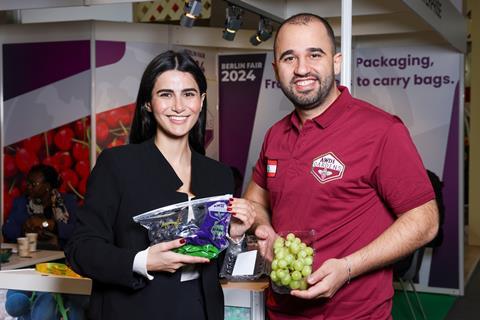Having experienced rapid growth in its grape exports to markets across the globe, Lebanese producer Awdi Gardens sees potential for Lebanese cherries, plums and kiwifruit

Lebanese grape exporter Awdi Gardens was thrilled to receive the Lebanese ambassador to Germany and former prime minister, Mustapha Adib-Abdul-Wahed, on its first time exhibiting at Fruit Logistica in Berlin. “He visited us and told us how proud he was of the work we’re doing to represent farmers in Lebanon, create jobs and invest in the economy, especially with everything currently going on in the region,” says the company’s Dalia Awdi.
The family business has its own grape production, but the company also sells for other producers in the country. “Ours is a family business,” she says. “My mother, my brother, my uncle and my cousin are all here in Berlin. With the issues in the region, not just the war in Gaza, but the economic crisis in Lebanon since 2019, the work we do is more important than ever. We are actually US citizens, but our family has made the choice to keep the business growing and continue to produce in Lebanon. Farming is a huge sector in Lebanon, and we want to elevate the image of Lebanon globally.”
Awdi Gardens is one of the largest exporters of Lebanese table grapes, exporting around 4,000 tonnes a year. “The volume has increased a lot,” adds Dalia’s brother, Ghassan Awdi, the company’s vice president. “We’ve been in the business for generations, but we’ve been focused on exporting grapes only for the last four years. We discovered the potential for Lebanon globally and recorded exponential growth since. We want to open up new markets and introduce Lebanon to new parts of the world. Mongolia, Philippines, Canada - these are all new markets that we see good potential in.”
The company also sees good possibilities for growth in Europe, and not just for grapes. “We’re very well set in Asia and Africa,” he says, “but because our grape volumes are growing, and we’ve also seen some potential for products like kiwifruit and plums in Europe, we want to have a bigger foothold in that market. There’s a lot of demand.”
“We have international ambitions,” says Dalia. “Everyone traditionally goes to the Gulf markets, but because we’ve lived all over the world, including in the US and UK, our minds are not limited. So we’re thinking of all these other markets. For example, we have introduced our grapes to Nigeria and Malaysia. The demand was already there in the Gulf markets, but because of our international ambitions, and our connections and our exposure abroad, we have looked to new markets.”
Awdi’s main grape varieties remain Crimson and Red Globe. The aim, according to the company, is to introduce new varieties, but first Lebanon probably has to join up to the International Union for the Protection of New Varieties of Plants (UPOV). Hopefully breeders and nurseries will give Lebanon a chance to grow some of these new varieties they’re developing soon,” says Ghassan.
A crucial factor in the company’s success, says Dalia, is the taste of Lebanese grapes. “They truly are delicious,” she insists. “We have a great climate in Lebanon. Many of our customers prefer Lebanese grapes, and Lebanese people living abroad prefer Lebanese grapes and seek them out. We’re lucky to have such a beautiful climate that allows us to produce such amazing fruits and vegetables, all naturally grown. Our country is small, but its geography is diverse.
“Our customers have been asking for other fruits, so we see potential in cherries, plums and kiwifruit. Our grandfather’s first farm was a kiwifruit farm. The climate in Lebanon is good for such fruits. We’ve always enjoyed the best fruit and vegetables from each part of our country, and we now want to share them with the world.”



